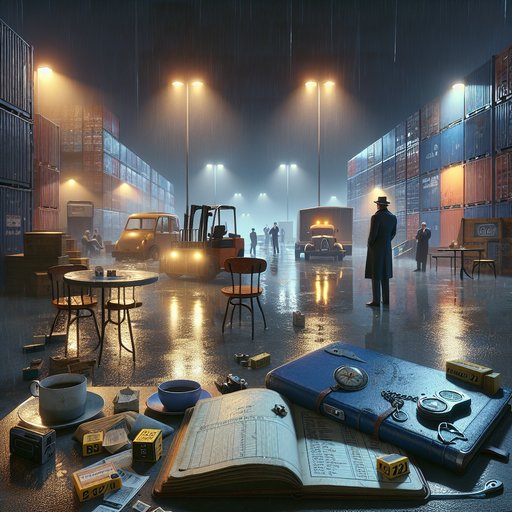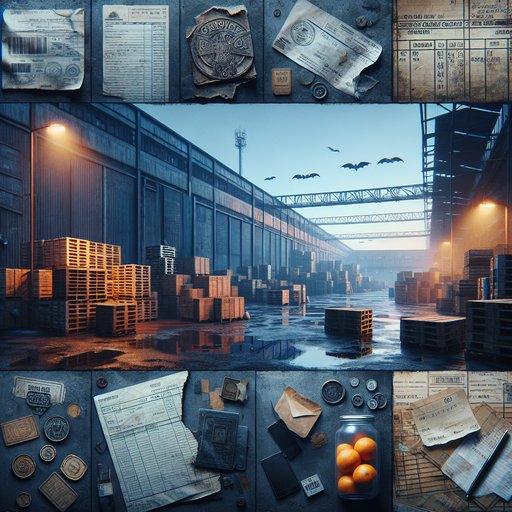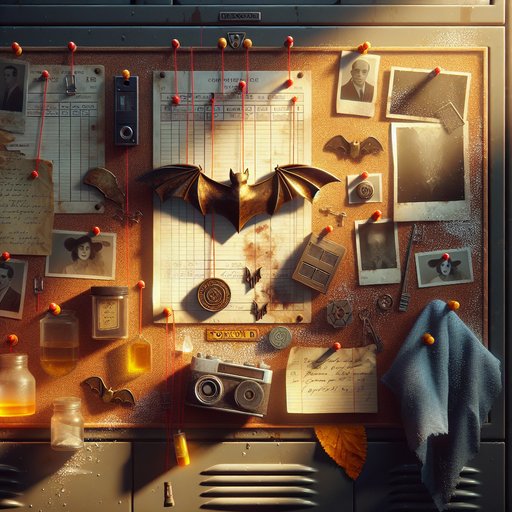CHAPTER 6 - The Ledger Inside the Lie

With a timered threat hanging over him, Juan chooses to retrieve evidence bag 7B from the Ciudad de la Justicia’s basement, using Nuria Paredes’s keycard. The chain-of-custody shows his trusted boss, Comisario Ferrer, signed the bag, but inside he discovers a secret envelope—Andrea Luján’s failsafe—containing a microcassette, negatives, a bat token, and a note: truth hidden inside a lie. He escapes security and meets the sidelined prosecutor in a shuttered café, learning Murciélago was buried when it touched donors and that Blanca had been her informant. The tape exposes “bat nights,” Vicent the porter’s complicity, and Ferrer and Conseller Vives discussing renumbering evidence while crates masked with orange oil move through the port. Gunfire and an arson attack force Juan and Andrea to flee; Nuria calls with a code phrase from Juan’s mother, warning that Ferrer controls the camera feeds and hinting that Andrea used Blanca to force action. At a storage locker in El Cabanyal, Juan finds the real donation ledger hidden inside a hollowed nautical almanac and a blue folder cross-referencing his brother’s overdose to the Murciélago matrix. As he reels, Comisario Ferrer arrives with two plainclothes and Nuria in tow, demanding the ledger and offering to let Andrea walk. Behind him, shipping patriarch Víctor Beltrán steps from the shadows. Faced with duplicity on all sides and the revelation that people he trusted may be complicit, Juan must decide which betrayal he can live with.
The timer in the photo advanced in red seconds over his own face: 00:18:42, 00:18:41, a countdown pasted above a grainy shot of him and Nuria in the archive corridor. Neon from the docks bled into his portside office, turning maps and mugshots the color of old blood while the sea sent a tin hum through the window glass. He fingered the warm Saint Michael medallion in his pocket until the edges bit his palm and tasted the salt of his own sweat. The ledger or the woman first—he had drawn boxes on the whiteboard, answered himself with arrows, then erased the whole thing in a clean white swipe.
He chose the ledger, chose 7B, and kicked the Moto Guzzi to life, its exhaust a bass note under the whine of the city awake too early for innocence. At the Ciudad de la Justicia, fluorescent light made the marble veins run like frost, and his polished-but-scuffed Oxfords squeaked in a rhythm he couldn’t trust. Nuria’s keycard—borrowed, not stolen, she’d said, the word lacquered with loyalty—breathed the service door open with a green blink, then another as the elevator descended to the storage level. He moved past wire cages labeled like a minimalist catechism—11-3, 12-2, 14-1—feeling the conditioned chill coil around his neck.
Almacén 14-1 smelled faintly of paper dust and citrus cleanser, an echo of the orange oil he had been chasing through days, rooms, and lies. Bag 7B sat precisely where a tidy mind would leave it, chain-of-custody card crisp, and when he read the last signature—Ferrer, Comisario—his stomach went cold even as his face stayed stone. The weight was wrong in his hand, too buoyant by a breath, and the seal’s crinkle, a hair off, made the hairs rise on his arms. He slid a nail under a corner, careful as a surgeon, and found beneath the official plastic a second envelope, vellum thick, its mouth kissed shut by a wax bat raised in bronze powder.
The inscription around the bat was unhurried: Si fuerzan el sobre, la verdad viajará dentro de la mentira. Inside lay a microcassette labeled MURCIÉLAGO/7B, three old-school photographic negatives fanned like a trio of shadows, a copper token stamped 7B and scratched with 14-1, and a square of paper: If they force me to swap, the truth will ride inside the lie. A.L. His breath hitched on the letters; Andrea Luján had built a secret inside the secret, trusting the inner shell to outlast requisitions and betrayals.
Footsteps fuzzed beyond the cage, the muffled jangle of keys and a cough that didn’t belong to a night guard who cared. Juan slid the inner envelope into his jacket and resealed the outer bag with the neatness of a tailor, fingers well practiced from years of late-night paper surgeries. He ducked down the service stairs, taking them two at a time, the medallion bumping his thigh like a heartbeat as an elevator hummed open above. Two flights up, he texted Nuria: pulled 7B, moving.
Her reply arrived in under a minute, coordinates and an alert—cameras rerouted for three minutes, west door clear—that flashed the same timestamp format as the photograph, and suspicion salted his mouth. Andrea waited in the back room of a shuttered café in Benimaclet, where the yellowing poster of a falles queen watched over dented coffee urns and a fly-struck mirror. She looked like a statue someone had nursed back from a fire—gaunt, eyes fierce, hair chopped blunt as if daring the world to tug it. “They buried Murciélago when it touched donors,” she said, voice low, as he laid out the microcassette, the token, and the note like a three-card salvation.
“The tokens were tickets and receipts, favors in bronze. Blanca was fed up with staging culture to cover contraband, and she agreed to help me switch the real ledger out, hide it in a place a bureaucrat would never look twice at.” Andrea slid a matchbook across the table, its paper spine crisp: Estación del Cabanyal—Locker 23. They huddled over the microcassette player Andrea produced from her bag, a plastic relic that smelled of hot dust when it clicked into motion. Ferrer’s voice—no mistaking the cadence he’d used to steamroll meetings and comfort grieving mothers in the same hour—floated through a veil of room tone.
“Bat nights stay on boats and in basements,” he said, words pouring slow as oil, and another voice, Mateo Vives’s public smile stripped to wire, answered, “Move the crates under donors; if the archivist asks, it’s sculpture.” They heard Vicent, the porter whose hands had trembled at the bat token, mutter, “I’ll leave the carts; you do the rooms,” and the scrape of a chair. “We renumber Testigo 7B, and the boy’s file remains lost,” Ferrer murmured, a line of cold that ran Juan back to a teenage bedroom tiled in paramedics’ blue gloves and a syringe glinting like a star no one wished upon. The café window coughed into a spiderweb, the crack arriving a blink after the sound, and Andrea threw the cassette player to the floor as a second round drilled glass into sugar. Outside, a whoosh like a dragon inhaling turned Andrea’s car into a low blue bloom, petrol scallops running under the chassis before lifting in petals of heat.
Juan grabbed Andrea’s wrist and shouldered the back door, leading her through the alley seam he’d paced as a rookie, into a garden of sagging laundry and scooters, the city’s private laundry hung for angels. His phone rattled and he nearly flung it, but the name glowing was Nuria’s, and the words—“Juan, la bibliotecaria te mandaría a la luz”—were his mother’s mantra for stubborn pupils. “Ferrer owns the feeds tonight,” she said, breath clipped; “I copied the logs, that picture is from our own house, and Andrea leaked Blanca’s statement to force a takedown; she’ll use you if you let her.”
Estación del Cabanyal smelled of iron, salt, and coffee burned into the counters, the old neighborhood making a cathedral of departure and return. Locker 23 yawned behind a scuffed door once he turned the matchbook key, revealing a nautical almanac with its heart carved out to cradle a ledger fat as a prayer and banded with twine.
The pages whispered of donations and donors, of token serials and beneficiaries, of “cultural shipments” that mapped too neatly onto arrivals his port unit had flagged years ago. A slim blue folder slid from the back, stamped with a familiar case number in a clerk’s round hand—his brother’s death—and a note in the margin, Murciélago/OD cluster cross-ref; jurisdiction denied. The words didn’t march; they fell through him, knocking loose the mornings in the Turia when he had run as if ahead of something that didn’t know how to stop. He was still standing in that drift when the locker row lights flickered and footsteps stitch-counted down the tiles.
Ferrer came first, coat open, tie knotted like a noose expertly tied by someone who didn’t expect to need it, two plainclothes shadows at his flanks. Nuria moved in behind them, face pale, eyes marked with sleepless notches, her hands empty; she only met Juan’s gaze for a second and looked away as if that were a gift. “Juanito,” Ferrer said, making the diminutive a tenderness and a threat, “you pick up all the wrong parcels when you run errands for ghosts.” Andrea stepped to Juan’s side, the ledger clutched like a psalter, and hissed, “He got Blanca killed with his injunctions.”
Ferrer spread his hand, inviting, like he had in every press conference when he reassured a city that refuses to be reassured. “Give me the books,” he said, voice soft enough to make obedience feel like relief, “and Andrea goes home; we correct this quietly, and you go back to being the man who cleans up everyone else’s mess.” Behind him, a silver flash of hair separated from the shadow of a pillar, and Víctor Beltrán y Rojas’s profile took the fluorescent light with the ease of a man who’d owned rooms all his life.
“Inspector,” Beltrán said, as if they were discussing weather on a yacht deck, “you brought our bat back to its belfry.” Juan’s medallion felt suddenly heavy, as if someone else’s hand had dropped a stone into his pocket, and he looked from Nuria to Ferrer to Andrea, their stories braided and barbed—so which betrayal dare he choose, and which truth can he still live with?


































































